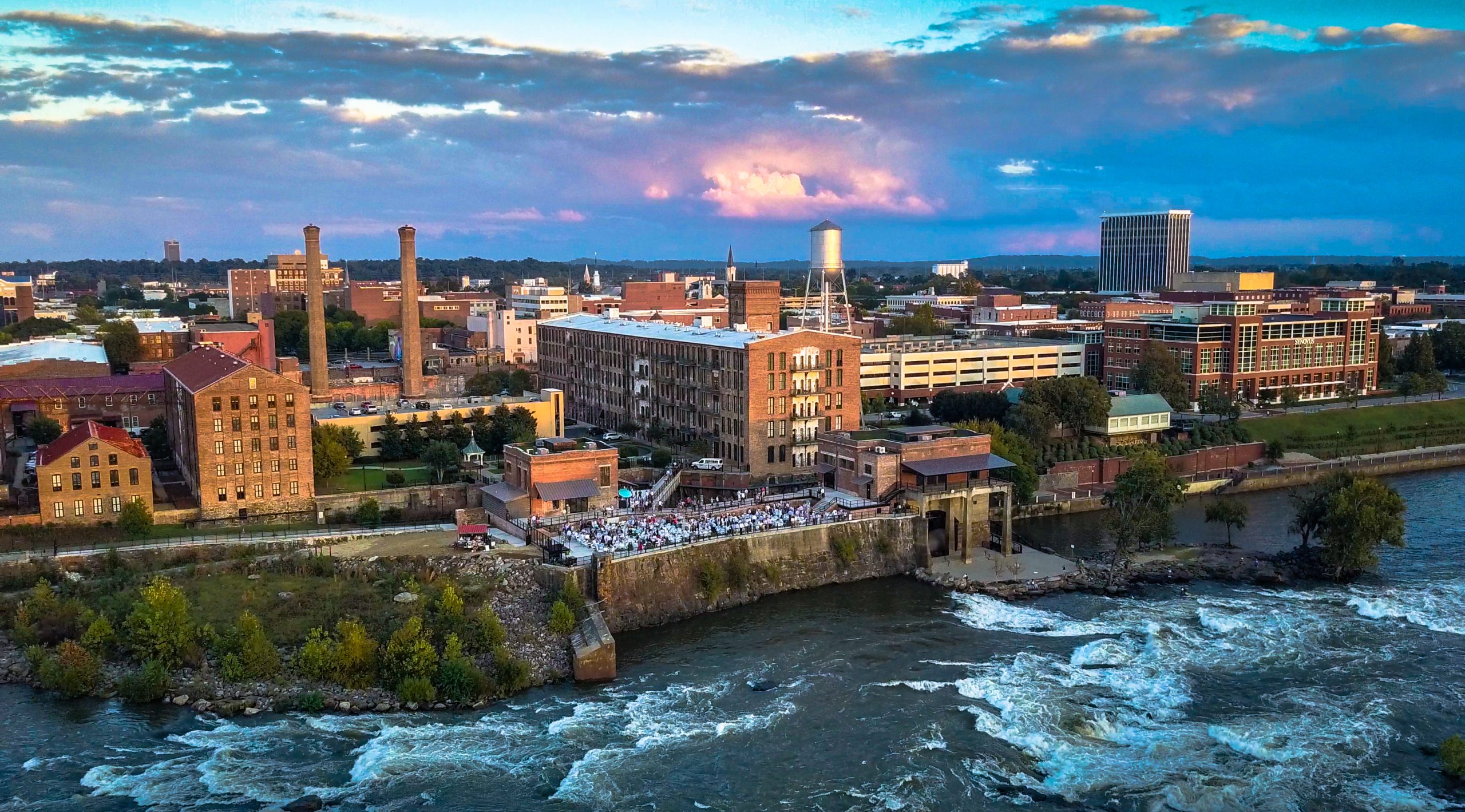By

Image courtesy of visitcolumbusga.com
Uptown Columbus, situated on the banks of the Chattahoochee River, has become a magnet for whitewater enthusiasts of all stripes. But it wasn’t always like that. In the 1850s, civic leaders installed dams in the river to generate hydroelectric power for the surrounding textile mills. However, as this industry waned over the next century, community leaders faced a crossroads: go big and take a chance on an unconventional vision or play it safe and risk a slow, quiet decline of their city. In the early 2000s, the decision was made to remove two dams to restore natural water flow to a 2.5-mile stretch of river adjacent to the city’s urban core. These enhancements paved the way to establish Columbus as a world-class rafting and whitewater waterway.
The river, which reopened in 2013, offers the longest section of urban whitewater rafting in the world, boasting more than five class IV+ rapids and 10 smaller rapids. With a dam-controlled flow, the course provides low-flow whitewater in the morning allowing for family-friendly adventures. In the afternoon, the high flow kicks in, sending up to 13,000 cubic feet per second of whitewater. At this point, the rapids jump from class III to V.
The entire project had a $26 million price tag. With the City of Columbus and the federal government contributing about $6 million and the remainder being raised privately. According to Ed Wolverton, president and CEO of Uptown Columbus Inc., Uptown BID, and WhiteWater Management LLC. “The entire project took about 15 years to come together,” he says. “We had significant hurdles to address from the Corps of Engineers along with environmental challenges related to impacts on fish and vegetation. My organization acquired two dams in the river, with one dating back to the 1860s.
Because of these land acquisitions, we actually owned about a 2.5-mile section of the riverbed. After hiring a design firm, tweaking water channels, and fabricating and installing an underwater wave shaper device, we blew the dams and opened the course in 2013. We then donated our riverbed land to the City of Columbus, and they now lease it back to us to operate river attractions.”

Image courtesy of VILevi via Adobe Stock
With the success of the whitewater elements, more exciting features were added including a zipline that spans over the river from Georgia to Alabama and back again, a splash pad, a playground, a disc golf course, and a hammock park. This is anchored by a 16-mile hiking/ biking trail along the river. Last year, a connector to other bike trails was completed, creating a trail network of about 60 miles. The combined assets are known as RushSouth Whitewater Park and all are part of Uptown Columbus’ thriving business district.
Columbus now averages 30,000 to 40,000 rafters annually. “As it is the southernmost area of the country that can offer yearround whitewater, kayakers from around the world also come here to enjoy our waves,” says Wolverton.
Prior to starting the project, Columbus State University conducted an economic impact analysis which estimated an annual impact of $42 million and 700 jobs. “In my professional opinion, the impact was overestimated,” says Wolverton.
“This being such a unique attraction, they had almost no comparable projects to use. Although we are now celebrating our 10th anniversary, we have been unable to fund a new study using operating data. While rafting and zipline numbers are easy to generate, the number of free users like kayakers, anglers, and others is a guess at best.”
However, Wolverton points out that since the project’s completion in 2013, Uptown has generated more than $721 million of new projects including complete, underway, and announced. These run the gamut from shops, restaurants, and offices to residential. Additionally, four new hotels have opened since 2021 including an Indigo, AC, Hampton Inn, and a 62- room boutique property.
“We’re thrilled to have the RushSouth Whitewater Park,” says Merri Sherman, executive director of the Columbus Sports Council. “The course is just steps away from restaurants, boutiques, and attractions and it’s a beautiful natural resource. Groups come in year-round to kayak and raft the river, and a lot of sports groups that visit for other events also take advantage of the rapids and often tack on a couple of extra days to their visits.”
“This is one of the most exciting places in the U.S. to go whitewater rafting,” exclaims Daniell Gilbert, operations manager of Whitewater Express, Columbus’ premier river guide and outfitter. He points out that the city is no stranger to international tourism, having previously hosted the Olympic softball competition in 1996. This past October, the city hosted the 2022 ICF Kayak Freestyle World Cup, which drew 106 athletes from 16 countries. This June, Uptown Columbus will host the 2023 ICF Canoe Freestyle World Championships that are expected to attract 300-plus competitors from more than 30 countries.
“These events have a big impact on business here, and people come to train year-round,” says Sherman. “The whitewater park serves a good combination of locals and visitors, and kayakers and other paddlers are moving to Columbus because of the resource. There are lots of things to do on the river and in town.”
Magazine
Playmaker Events
Connect with playmaker